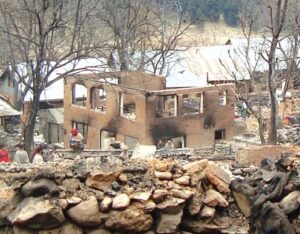The Trap of “Kashmiriyat”: Unmasking the Occupier’s Narrative
Mujtaba Nabi
What is “Kashmiriyat” if not a cunning invention, a convenient mirage constructed to serve the occupier’s narrative? For decades, the term has been dangled like a leash around Kashmir’s neck, a soft power tool designed to disarm, confuse, and render the Kashmiri people docile. Stripped of its poetic pretense, “Kashmiriyat” has become a mechanism of control which demands that Kashmiris embody an unnatural and self-sacrificial hospitality even in the face of injustice.
This propaganda is most visible during events like the recent heavy snowfall, where stranded Indian tourists were welcomed into Kashmiri homes and mosques. The scenes were painted as heartwarming displays of humanity, but beneath the surface lies something else. This narrative of hospitality serves to obscure the ongoing oppression and puts Kashmiris under pressure to act nice. Meanwhile, dozens of Kashmiri students were recently thrown out of an Indian university. These young men and women, far from their homeland, were humiliated and left vulnerable.
Time and again, Kashmiris have been brutalized across India. Shawl sellers beaten and robbed in Haryana. Businessmen harassed. Students attacked for their identity and the occupiers expect, even demand that Kashmiris smile, serve, and submit. This is the insidious power of “Kashmiriyat,” a term weaponized to silence resistance and enforce compliance.
Kashmiris are pressured to prioritize hospitality over survival and forget their own grief and apprehensions. This is in no way a cultural pride but a psychological operation. The occupiers have romanticized “Kashmiriyat” to mean meekness, docility, and an unquestioning embrace of exploitation. It is a gilded cage and a narrative trap designed to bind the occupied to the occupier with invisible chains.
This confusion and this acceptance of “Kashmiriyat,” becomes all the more dangerous in the context of settler colonialism. As Indian tourists drink alcohol publicly in a Muslim-majority region, flouting societal norms, their presence is normalized. Settlers rarely arrive with weapons. They come with suitcases, pretending to blend in, while their very presence shifts the balance of power. We know what happened in Palestine. Hospitality extended to settlers becomes a source of regret as they later on wield authority over the land and its people. Are we destined to repeat this mistake?
Kashmir is at a critical juncture. The occupiers are waging a psychological war. By pushing “Kashmiriyat,” they seek to erase critical thinking, weaken resistance, and distract from their settler colonial designs. It is important for every resident of Kashmir to develop a critical lens. Look around. Understand the motives behind every narrative, every project, every pretext.
To resist effectively, we must shed this manufactured politeness. Hospitality is not an obligation in the face of a chronic military occupation. It is a choice that must be weighed against the larger consequences. Being kind to those who are complicit in your suffering is not virtue but a betrayal of one’s own dignity and cause.
The time has come to redefine what it means to be Kashmiri. It is not about bending over backward to please the occupier. It is about standing firm, recognizing the designs that threaten to erase us, and refusing to be complicit in our own subjugation. Kashmiris must remember that resistance is not merely physical; it is intellectual, cultural, and psychological. To resist the occupier’s narrative is to reclaim one’s agency and to assert one’s identity. Reject the propaganda of “Kashmiriyat” and replace it with a narrative of resilience, awareness, and self-respect. This is not only a battle for land or culture but for the soul of a people. Let us not allow it to be stolen by those who wish to erase us.



